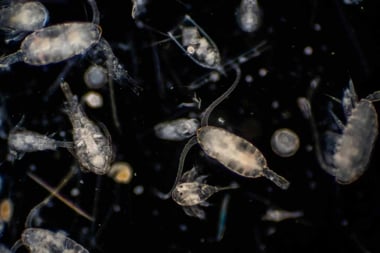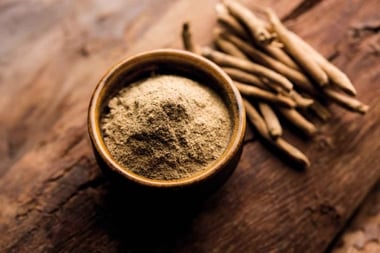Herbs You Won't Forget

People have come to expect that their ability to remember will begin to deteriorate as they age. This is not necessarily true. The aging process itself has little, if any, bearing on the recall of information..
People have come to expect that their ability to remember will begin to deteriorate as they age. This is not necessarily true. The aging process itself has little, if any, bearing on the recall of information.
Occasional memory lapses are a natural, normal part of life at any age, but with proper diet and nutrition and continued use of the mind, the memory should remain sharp and active into one’s 90s or beyond. A lack of concentration accounts for most memory loss, such as having too much on your mind or thinking of three things at once.
Probably the greatest fear provoked by lapses in memory is Alzheimer’s disease. This is a fairly common disorder among older people, but it is important to realize that most memory lapses are not related to Alzheimer’s.
One reason people suffer from memory loss is an insufficient supply of necessary nutrients to the brain. The brain is surrounded by a protective envelope known as the blood-brain barrier, which allows only certain substances to pass. If the blood is "thick" due to harmful cholesterol and triglycerides, this decreases the amount of blood entering the brain. As a result it eventually becomes malnourished.
There are numerous other factors involved in the deterioration of memory. One of the most important is exposure to free radicals, which can cause enormous damage to the memory if unchecked. Nutritional deficiencies, especially deficiencies of the B vitamins and amino acids, account for memory loss in some individuals. Allergies, hypoglycemia, candidiasis, stress, thyroid disorders, and poor circulation to the brain may be contributing factors. Other factors that can impact memory are low energy, tiredness and anxiety.
Some herbs that help to improve memory by sending more blood to the brain are ginseng, hawthorn and gotu cola. In one study, a ginseng tincture increased the brain’s blood flow by an impressive 34 percent. These herbs enhance mental abilities, including concentration, aptitude, behavior, alertness and even intelligence. They are especially effective for someone who has had a decline in mental abilities due to illness, stress or age.
Don’t Forget Your Herbs
Tonics herbs are basically food for the brain, and are therefore very safe for long term use. They are high in nutrients that act to rebuild, replenish, regenerate and rejuvenate brain tissue, thereby helping to improve cognitive functioning and memory.
Gotu cola (Hydrocotyle asiatica) is an ancient Ayurvedic remedy that acts as both a tonic and a stimulant, helping to regenerate bone, muscle, nervous and brain tissue. In India it is valued chiefly as a revitalizing herb that strengthens nervous function and improves mental acuity. It increases intelligence, longevity, memory and decreases senility and aging.
Oats (Avena sativa) are useful for rebuilding nervous tissue and brain tissue. They also decrease oxidation of cells and are useful for stroke, blows to the head and severe anorexia where cell death may have occurred. Avoid rolled oats, as these are a processed grain that has lost most of its nutrient content.
Damiana (Turnera diffusa) is a great herb for the nervous system, helping in conditions such as nervous debility, anxiety, poor concentration and fluttering of the mind. It acts to regulate brain activity by being calming when you need to be calm and stimulating when you need to be alert. Damiana also acts as a male and female sexual tonic and an anti-depressant.
St John’s wort (Hypericum perforatum) facilitates nervous regeneration, especially of the myelin sheath that surrounds nerves. It is an excellent tonic for brain damage, post-stroke and multiple sclerosis.
Periwinkle (Vinca major/minor) enhances the ability of the brain to utilize oxygen and glucose and thus stimulates brain function. It is the aerial part of the garden periwinkle that is used for memory enhancement, not the Madagascar species.
Rosemary (Rosmarinus officinalis) has been used since antiquity to improve and strengthen the memory. Even today it is burned in the homes of students in Greece who are about to take exams. Rosemary was a symbol of fidelity between lovers, due to its ability to improve the memory. It’s a warming herb that stimulates circulation of blood to the head, improving concentration and memory.
Nutritional Supplements
Phosphatidylserine (PS) is a phospholipid that is bound to an amino acid (serine), a very prevalent molecule in the brain. Our bodies require folic acid and B12 to produce phosphatidylserine and our ability to produce it decreases as we age.
Phosphatidylserine plays a major role in determining the integrity and fluidity of the membranes that surround the brain cells. Supplementing with 200 mg of phosphatidylserine daily can increase cognitive ability and improve recall and memory. Low levels of phosphatidylserine in the brain are associated with impaired mental function and depression in the elderly.
Carnitine is a vitamin-like compound that transforms fatty acids into energy for muscular activity. It’s concentrated in the brain, sperm and the skeletal muscles. A special form of carnitine, L-acetylcarnitine (LAC) is used to improve memory, cognitive ability and Alzheimer’s disease. A typical dose is 500 mg three times a day.
Docosahexaenoic acid (DHA) is a major omega-3 fatty acid of the brain that is necessary for good brain function. It’s the most abundant fat in the brain and the retina of the eye. Children who ingest sufficient quantities in infancy and childhood have better vision and are faster learners. The body makes DHA when there are sufficient levels of omega-3 and -6 fatty acids in the diet, but most of what the body needs is obtained from the diet.
Salmon, mackerel, sardines, anchovies and other cold-water fish have the highest levels, with eggs and red meat having only small amounts. DHA supplements derived from fish oil, algae, flax, soy and walnut oils are also available. DHA is currently being added to baby formulas in the US and vegans should supplement their diet with 100 mg daily as it is only found in animal sources.
Phosphatidylcholine (lecithin) is a type of B vitamin that is found in garlic, soy, lettuce, whole grains and cauliflower. Lecithin may be useful to enhance healing of nervous and brain tissue and has been shown to increases levels of acetylcholine in the brain, making it useful for memory loss in Alzheimer’s and bipolar depression. Taken in high doses it can cause digestive problems, therefore it may better to supplement with 25-30 grams of phosphatidylcholine.
Other Considerations
Aromatherapy is very important to help to improve memory and brain function. The good scents that help in this regard are rosemary, bergamot, basil, and grapefruit. A useful trick for people wanting to memorize something is to smell one of these essential oils while memorizing and then sniff it again when trying recall it.
Get a hair analysis to rule out heavy metal poisoning, such as aluminum and lead. Either of these metals can lead to decreased mental functioning.
Ensure you are providing your brain with the proper nutrients to boost brain power, notably vitamins C and E, selenium and zinc. A lack of potassium, which accounts for memory loss in some people, is easily remedied with tablets.




